Author: abermeo
70 AIRLINES GATHER IN QUITO TO DECIDE FUTURE OF AIR TRAVEL IN THE AMERICAS
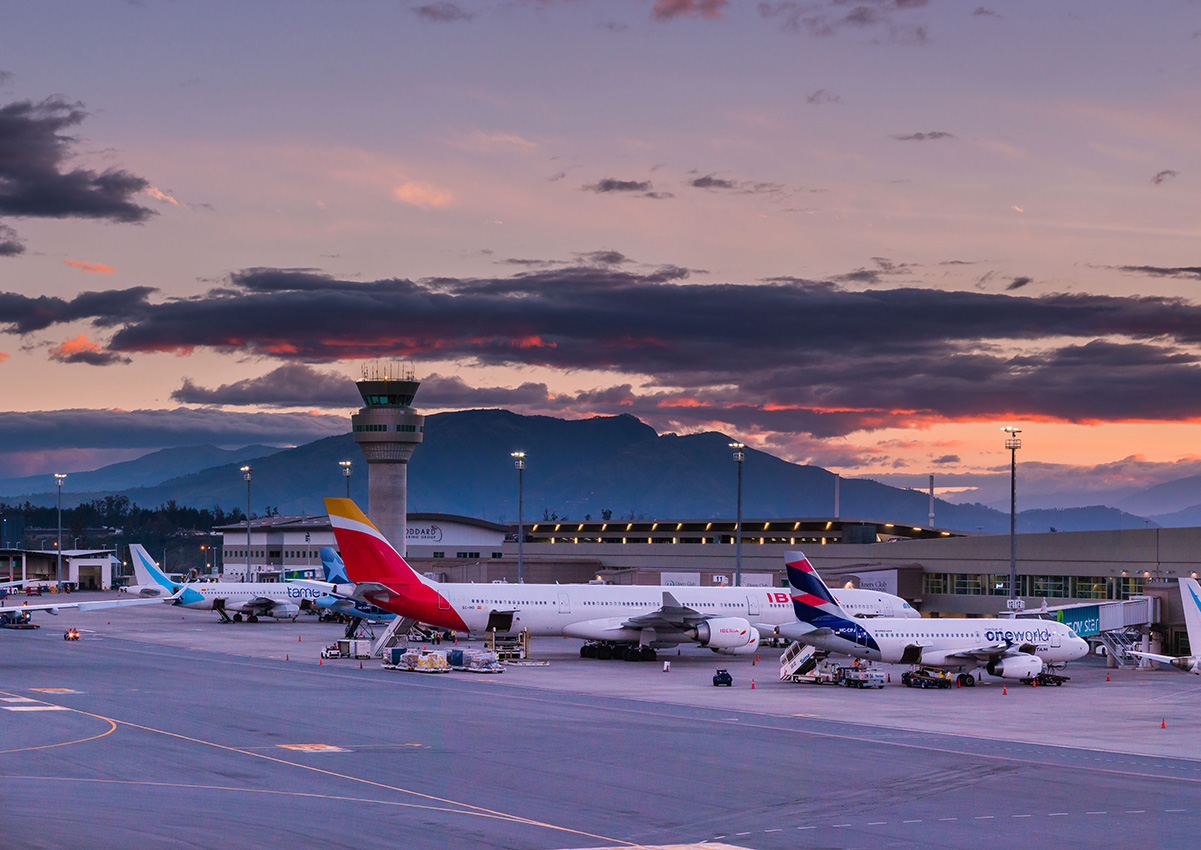
- The aviation industry will gather in Quito next week (13-15 February) at the 11th annual Routes Americas to plan and negotiate new air services within North and South America and the Caribbean.
Routes Americas brings together airlines, airports and tourism authorities to develop air route networks. It moves to a new city every year to highlight the diverse aviation markets across the Americas. The 2018 event is hosted by the Municipality of Quito, Secretariat of Productive Development and Competitiveness, Quito Turismo and Corporación Quiport.
The event will bring together 650 delegates taking part in 2,100 meetings. Leading airlines that will attend include American Airlines, International Airlines Group (IAG), Aeroméxico, Air Canada, LATAM, TAME and JetSmart. Around 70 airlines, 150 airports and 35 tourism authorities are expected in total.
The latest issues and challenges facing aviation in the Americas will be debated the event’s conference sessions, including how the industry across South and Central America has picked itself up following a series of devastating natural disasters in 2017.
High-profile speakers include: Juan Carlos Zuazua, Chief Executive Officer, VivaAerobus; Declan Ryan, Chief Executive Officer, Viva Air; Maribel Rodriguez, Regional Director of Southern Europe and LATAM, World Travel & Tourism Council (WTTC); and Peter Cerdá, Regional Vice President, The Americas, International Air Transport Association (IATA).
Quito is a rapidly growing tourism destination. Named as one of the first UNESCO World Cultural Heritage Sites in 1978, the city has a well-preserved Spanish colonial centre and is the gateway to the Ecuadorian Amazon and the Galapagos Islands.
The travel and tourism industry in Ecuador directly supported 137,500 jobs in 2016 and its GDP contribution was more than $2bn. The World Travel & Tourism Council has estimated that the sector’s employment contribution will rise to 196,000 jobs by 2027 and its GDP could be worth $3.36bn, equivalent to 2.5 percent of overall GDP.
In December 2017, Ecuador’s president Lenín Moreno signed an executive decree for the adoption of an Open Skies policy – a move that has the potential to boost connectivity, unlock new markets, increase tourism and create new jobs.
Quito International Airport is the main gateway to Ecuador. As a result of Quiport’s efforts in acquiring new international destinations with an increased number of airlines in operation, the airport’s IATA Connectivity Index has more than doubled within the last six years (from 4.25% to 10.24%). The airport has invested more than $133m in projects to improve the infrastructure and quality of services.
“Hosting Routes Americas will help Quito realise its growth potential, with opportunities to develop the network on both domestic and international routes following the recent announcement of Open Skies.” said Steven Small, brand director of Routes.
Andrew O’Brian, CEO of Quiport remarked that “having Routes Americas in Quito represents a unique opportunity to unite in the Middle of the World the main planning executives of the most important airlines operating in the hemisphere. This will allow us to show the quality of airport services for both passengers and airlines, as well as the infrastructure and efficiency in the operation of our airport”.
“Routes Americas, the leading air connectivity event in Latin America, places Quito in the eyes of the world. It opens doors to new opportunities for tourism, business and investments in a strategically located city, with the most modern airport in the region, full of alternatives and options for people with unlimited vision,” stated Alvaro Maldonado, Secretary of Productive Development and Competitiveness from the Municipality of Quito.
More information about Routes can be found at routesonline.com
Routes Americas 2018, 13-15 February, Centro de Exposiciones Quito (CEQ), Quito, Ecuador.
QUITO AND QUIPORT, HOSTS OF INTERNATIONAL AVIATION SAFETY EVENT
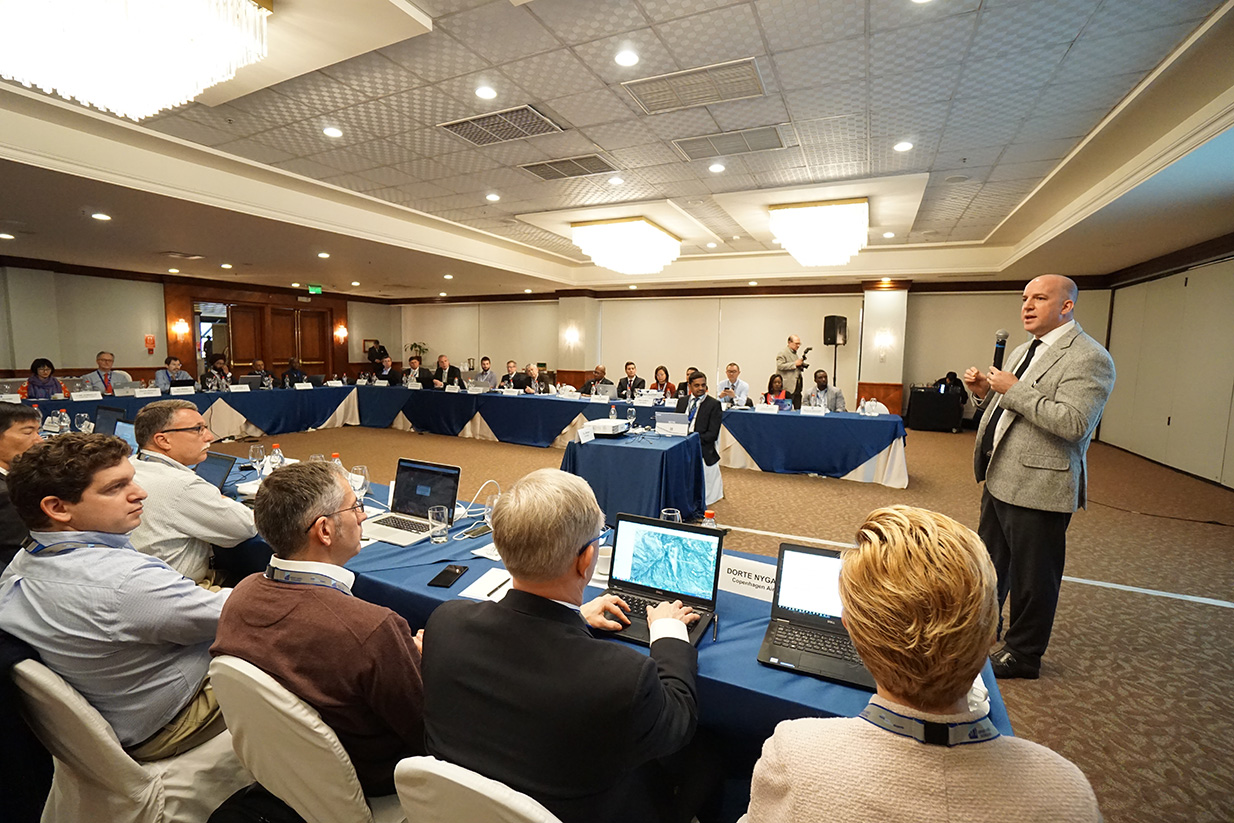
- The event brings together 40 airport operations and security professionals from all over the world in order to discuss current issues in this field and share best industry practices.
From February 5 to 9, the 37th meeting of the World Safety and Technical Standards Standing Committee is being held in Quito, organized by Airports Council International (ACI), the entity that groups all of the world’s civil airports.
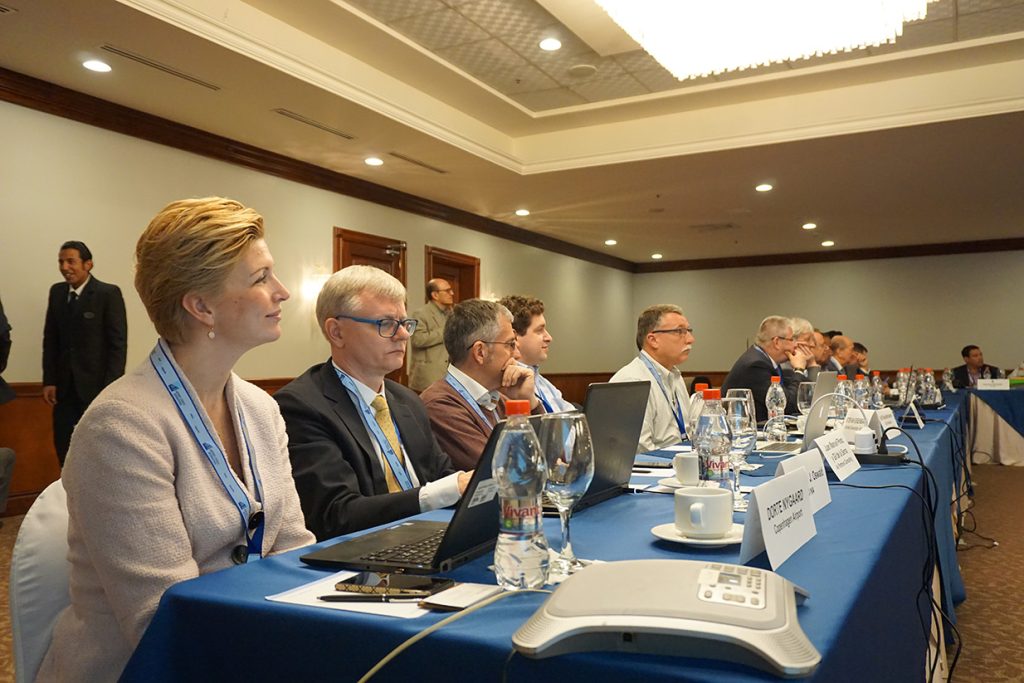
At this meeting, 40 airport professionals from different cities (Copenhagen, San Francisco, Geneva, Doha, Vienna, Delhi, Paris, Hong Kong, Mexico City, Accra, London, Johannesburg, Kansas City, among others) will discuss important airport safety issues, key safety indicators and data collection, marking of taxiway edges, as well as issues related to cyber menaces that threaten the safety of airport operations.
On February 7th, the Operating Safety Committee of the Airports International Council – Latin America and the Caribbean (ACI-LAC) will meet to discuss issues such as the implementation of Runway Safety Committees in airports of the region, the update of the Aerodrome Certification process, standardization of operating indicators in the region, among other issues of great importance for the airport industry.
In his welcome, Mr. Andrew O’Brian, President and Director General of Quiport, stated that “the dynamics surrounding operating safety force us to keep ourselves up to date and to be even one step ahead in this field. In order to do so, meetings such as these are of vital importance in order to discuss the principal issues regarding operating safety and share best industry practices”.
Mr. Alan Padilla, Director of Operations of the Quito airport, who also chairs the World Safety Committee, will participate in the event. Mr. Padilla will speak about the regional safety week, best industry practices, runway safety equipment, among other topics.
Corporación Quiport will host this important event, thanks to the efforts performed in operating safety, thereby positioning itself as an industry leader.
APPROXIMATELY 15,000 TONS OF FLOWERS WILL BE TRANSPORTED FROM QUITO TO THE WORLD FOR VALENTINE’S DAY
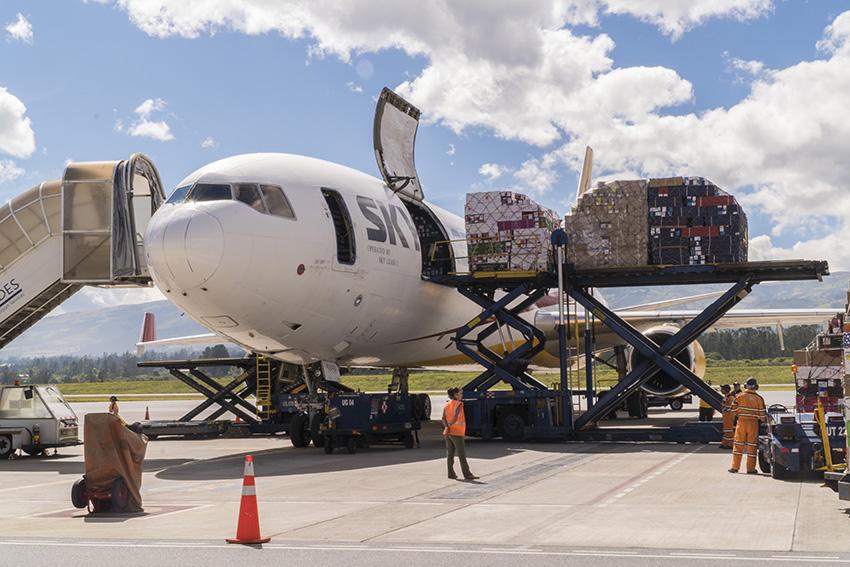
The peak cargo season at the Mariscal Sucre International Airport began on January 20 and will last until February 10. The air terminal has an expanded cargo platform to park large-size aircraft simultaneously, allowing a cargo of 15,000 tons of flowers – 15.4 % more than last year—to reach the world for the Valentine’s Day celebrations.
Varieties with great beauty and unparalleled quality make Ecuadorian roses one of the most sought-after products in the world, primarily during the Valentine’s Day holiday. Because of this, the Mariscal Sucre International Airport launched the 2018 peak cargo season with an expanded platform that permits the simultaneous parking of six large capacity aircraft (three code F aircraft (Boeing 747-800) and three code E aircraft (Boeing 747-400, Boeing 777-200 and MD-11)), which would facilitate the transport of approximately 15,000 tons of cargo— 15.4% more than last year, according to data provided by Corporación Quiport, concessionaire of the city’s airport.
According to Andrew O’Brian, president and director general of this entity, the Mariscal Sucre International Airport exceeded the sum of 13,000 tons transported during the peak cargo season last year. In 2018, a cargo of above 15,000 tons is projected, in 22 days. Expansion of the cargo platform was a measure taken by Corporación Quiport in order to satisfy the demands of one of the country’s principal industries, whose peak production period is for the Valentine’s Day season.
“We work towards contributing to the improvement of international trade conditions in Quito and Ecuador; our actions are focused on providing facilities to users, companies and airlines, to continue to make the Quito Airport a gateway for the country’s development,” stated O’Brian, who also highlighted the collaborative and swift work of the General Civil Aviation Directorate to make the platform operational in a timely manner. Quiport invested 3.5 million dollars in the expansion of the cargo platform.
The aircraft that can simultaneously load this national product as of January 20 in this ample space and in accordance with international standards, all have large sizes and capacity as common features. A code F aircraft carries 120 tons, while a code E aircraft transports between 90 and 110 tons. During the 22 days that the peak cargo season lasts, aircraft originating from the United States, the Netherlands, Spain, Luxembourg, Qatar, the United Arab Emirates and Russia will arrive in Quito in order to transport the majestic Ecuadorian flower.
In general, the area dedicated to cargo passed from having 15,198 square feet, at the old airport, to 45,000 square feet at the current terminal. This translates into an increase of transport capacity that went from 150 thousand metric tons to 250 thousand per year. In this way, the capital’s airfield prepares itself to contribute to a market that is growing increasingly.
According to Instituto de Promoción de Exportaciones e Inversiones (ProEcuador), the export of fresh cut roses increased by 5.4% between January and October, growing from US$ 517 million in 2016 to US$ 545 million in 2017.
QUITO AIRPORT FIREFIGHTERS RECEIVED “BEST WATER ARCH SALUTE” AWARD
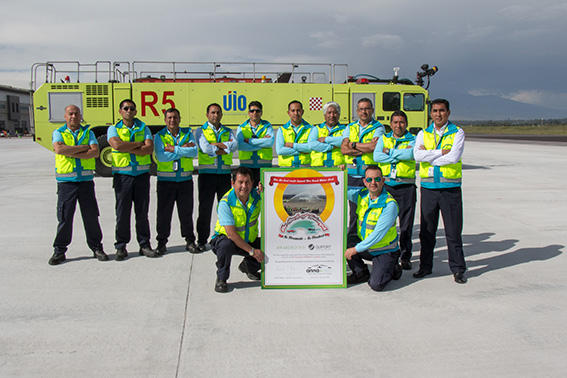
The Mariscal Sucre International Airport Firefighters won the first place in a competition organized by Airline Network News and Analysis (anna.aero) that honors the best water arch salute during an arriving or departing inaugural flight.
The arch that obtained this recognition took place on January 2, 2018, to honor Air Europa’s inaugural flight to Quito.
This tradition takes place at airports throughout the world in special occasions – such as upon commencing new operations – to wish good fortune to the airplane and airline.
In order to participate in the competition, the perfection of the water arch created by the airport firetrucks has been taken into consideration.
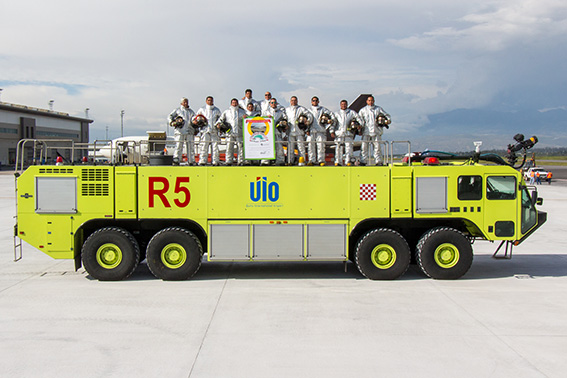
Such recognition demonstrates the perfect work and coordination of the Quito International Airport firemen who surprised the competition by taking care of each detail for it to so successfully be completed and, of course, without neglecting the protection of airport operations at the Ecuadorian capital city.
AIR EUROPA BEGINS ITS OPERATIONS IN QUITO WITH PROJECTIONS TO TRANSPORT 90,000 PASSENGERS PER YEAR
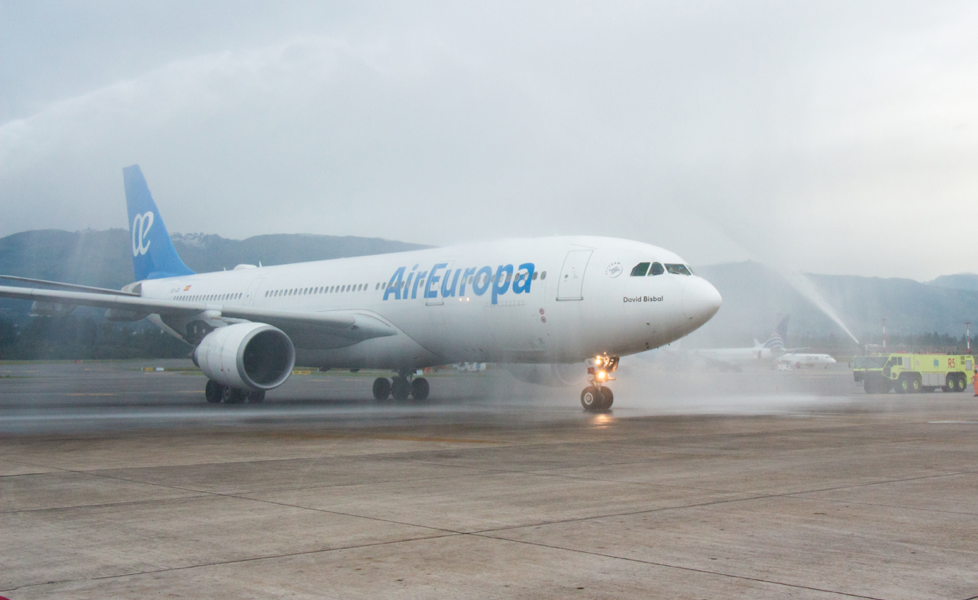
- The Spanish airline arrives to become a part of the map of routes connecting Quito and Ecuador with the world. The aircraft landed at 6:59 a.m. on January 2nd, coming from Madrid and departed for Europe at 9:20 a.m. after a heartwarming celebration.
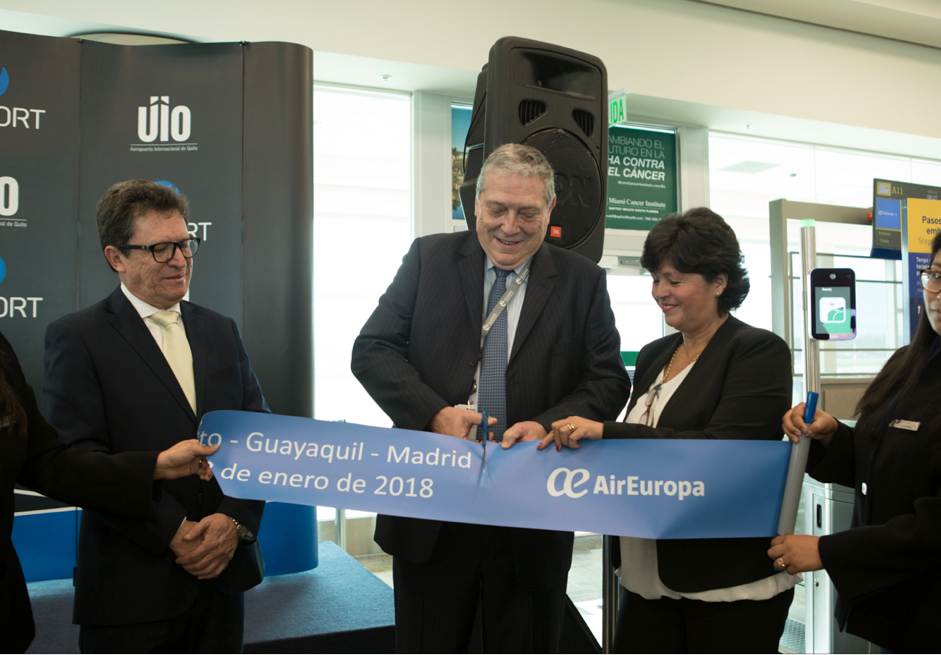
Gastronomic delicacies from the Iberian Peninsula, a welcome toast, and good wishes were the elements of the ceremony held by Quito’s International Mariscal Sucre Airport to celebrate the arrival of Air Europa at Ecuador’s capital and its integration into the air terminal’s strategy of greater connectivity performed through its concessionaire, Corporación Quiport.
At 6:59 a.m. on January 2nd, the A330-220 aircraft— with a passenger capacity of 299— landed on Quito’s soil after an 11 hour flight from Madrid’s Barajas International Airport. The customary water arch, routinely utilized to receive airplanes inaugurating a new route, signaled the beginning of Air Europa’s operations. For Ecuador, this route represents a possibility of expanding its commercial and tourism relationships.
Air Europa will cover the Madrid-Quito-Guayaquil-Madrid route, in a triangular flight that will have three weekly frequencies (Mondays, Wednesdays, and Thursdays) during the off-peak season and five frequencies during months considered to have high-demand (June, July, August, December, and January). According to the airline’s data, this route is projected to transport 90,000 passengers per year.
Andrew O’Brian, President and CEO of Corporación Quiport, explained that Air Europa’s arrival answers to a strategy that was planned based on demands for greater connectivity of the city and the country. The senior executive stated, “we are convinced that Ecuador’s development is strengthened by quality transportation services; the arrival of this airline will allow the expansion of the country’s tourism and business potential”.
Meanwhile, via Air Europa’s web page, the airline’s commercial director, Imanol Perez, highlighted, “for Air Europa, Quito was a long overdue destination. When we inaugurated a route to Guayaquil, one year ago, we had already stated our goal of transporting our passengers to Quito and demonstrating its great potential to them.” With Quito, Air Europa offers 21 destinations in the Americas, thereby progressively increasing the connection between both continents.
The designation of the Mariscal Sucre airport as the best airport in the region and dozens of national and international awards for its management are factors for airlines increasingly deciding to travel to Quito and reaffirming its status as a gate of entry to Ecuador.
Yves Gautier, director of operations of the Mariscal Sucre Airport, welcomed the passengers and crew of the inaugural flight highlighting that this is a great way to begin the new year in terms of growth for the Mariscal Sucre. “This responds to a general route development strategy. This year will bring lots of good news for the connectivity of Quito and Ecuador”, he stated in closing.
Germania Salme, Air Europa’s Commercial Manager in Ecuador stated that the airline’s arrival in Quito responds to the national government’s intentions to bolster Quito and Ecuador as a tourist destination.
The Ecuadorian Ambassador in Spain, Cristóbal Roldán, was present as a special guest of the event. Mr. Roldán emphasized the efforts of the national government to increase air connectivity. As an effort to achieve this, the President signed an “open skies” decree that aims to attract more international airlines to operate in Ecuador.
At 9:20 a.m., the aircraft started its engines to continue its return flight to Europe, making a prior stop in Guayaquil.
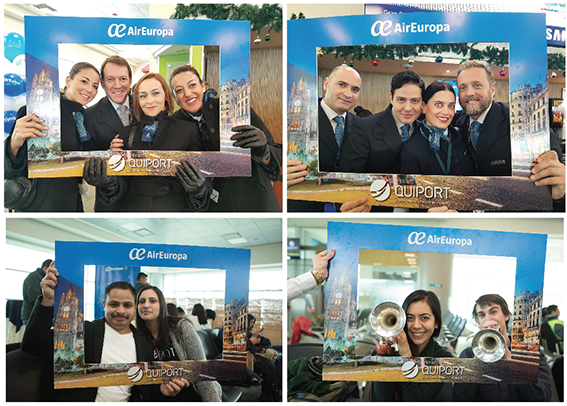
QUITO AND CUENCA AIRPORTS SIGN COOPERATION AGREEMENT FOR OPERATIONS MANAGEMENT
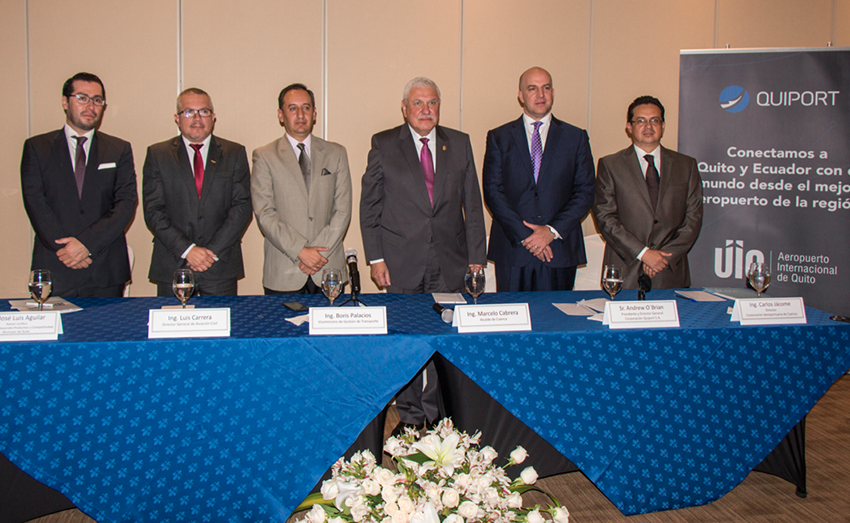
- The agreement includes matters related to cooperation in airport management, exchange of information between both companies and training to develop best practices in user and passenger service.
With the presence of Cuenca’s mayor, Marcelo Cabrera, as honorary guest and the Vice Minister of Transportation Management, Boris Palacios, Corporacion Quiport, concessionaire of Quito’s airport, and Corporación Aeroportuaria de Cuenca (Corpac) signed a cooperation agreement that would allow the sharing of information, knowledge and experience in airport management which aims to enable mutual enrichment and development of both air terminals.
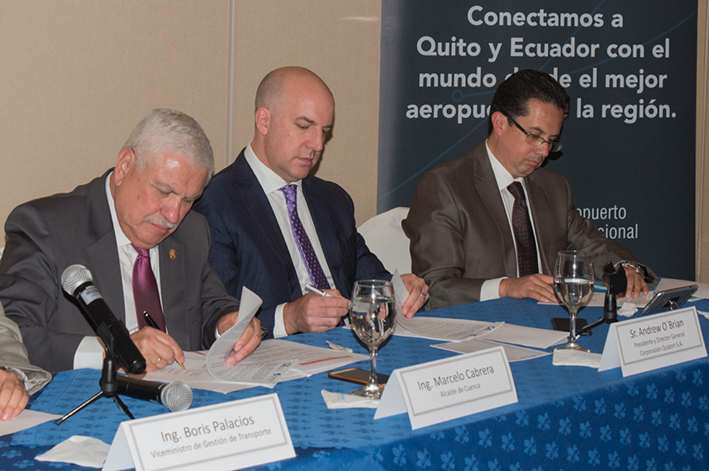
During the event held this Monday at the Wyndham Quito Airport Hotel, Andrew O’Brian, President and General Director of Corporacion Quiport explained that this agreement strengthens the ties of friendship and solidarity in order to create a collaborative work ecosystem that will improve the quality of the country’s airport services.
“We began this cooperation convinced that sharing tools to better manage our airports is one of the means to develop our two cities’ potential; we thank Corpac for its trust and reiterate our commitment to Cuenca and Ecuador,” said Quiport’s principal executive.
The areas of cooperation practically cover all aspects of airport management and include matters such as security, operations, maintenance, commercial development, route development, infrastructure, information systems, customer service management, environment and energy efficiency.
In turn, Carlos Jácome, Corpac’s director, highlighted that given Cuenca’s growth and development, signing this agreement— which permits collective work with Quiport’s team to be able to strengthen technical and administrative areas in order to share experiences between both air terminals— is an honor. It would not only improve the quality of services, but it would also reinforce the brotherly ties between Quito and Cuenca. “We thank those who have worked on this matter. Thank you all for this approach and for your trust in this project.”, said Jácome in closing.
Luis Carrera, Director of Civil Aviation, explained that the objective of the General Directorate of Civil Aviation is to promote aviation and that this type of agreement contributes to this goal, especially pertaining to operational safety. He highlighted, “we are convinced that all our work puts us both at the forefront of other international airports with respect to operational safety. I congratulate Quiport and Corpac for this initiative; these exercises demonstrate the importance of working with all agencies.”
José Luis Aguilar, representative of the Secretariat of Productive Development and Competitiveness of the Municipality of Quito assured that “the city is pleased with these types of agreements because they not only strengthen the ties of brotherhood between the airports, but between both cities as well. Reinforcing air traffic between the two cities is a form of reactivating the economy and promoting our efforts towards tourism. From the Municipality, we acknowledge Quiport’s leadership because its management of the airport has placed it as one of the leaders in the region and we are sure that Corpac would benefit from this experience; we applaud Quiport for its successful management, for everything it has achieved for the city and the country.”
Meanwhile, Boris Palacios, Vice Minister of Transportation Management (MTOP), highlighted that the MTOP focuses on efforts to improve citizens’ quality of life. “On a global level, a trend is emerging of city-models that encourage a network that improves air connectivity, which not only benefits airports, but also causes an impact on thousands of persons, generates jobs and promotes economic development.”
Finally, the Mayor of Cuenca, Marcelo Cabrera, stated that to the municipality of Cuenca, “signing this new agreement with Quiport is encouraging and satisfying; we are aware of Cuenca’s potential but our Mariscal La Mar airport also has certain limitations. What we have asked Quiport is to learn from its successes; we have requested its advice because Cuenca needs to migrate towards an airport with high quality standards, better services and, in the long-term, a new airport with better services for our citizens, tourists and entrepreneurs.”
With over 10 years of experience in the operation, management, and maintenance of Quito’s Mariscal Sucre International Airport, both the old airport as well as the one located in the Tababela area, Corporacion Quiport has been internationally recognized for its management of the capital’s air terminal thanks to management that is planned and focused on the needs of the country and the city, as well as the airport’s passengers and users.
This experience will be shared with Corporación Aeroportuaria de Cuenca, so that the Mariscal La Mar International Airport strengthens its services with a view to the touristic and business potential of Azuay’s capital city.
“NUESTRA HUERTA” – A STORE INSIDE THE QUITO AIRPORT WHERE LOCAL PRODUCTION CAN BE ENJOYED
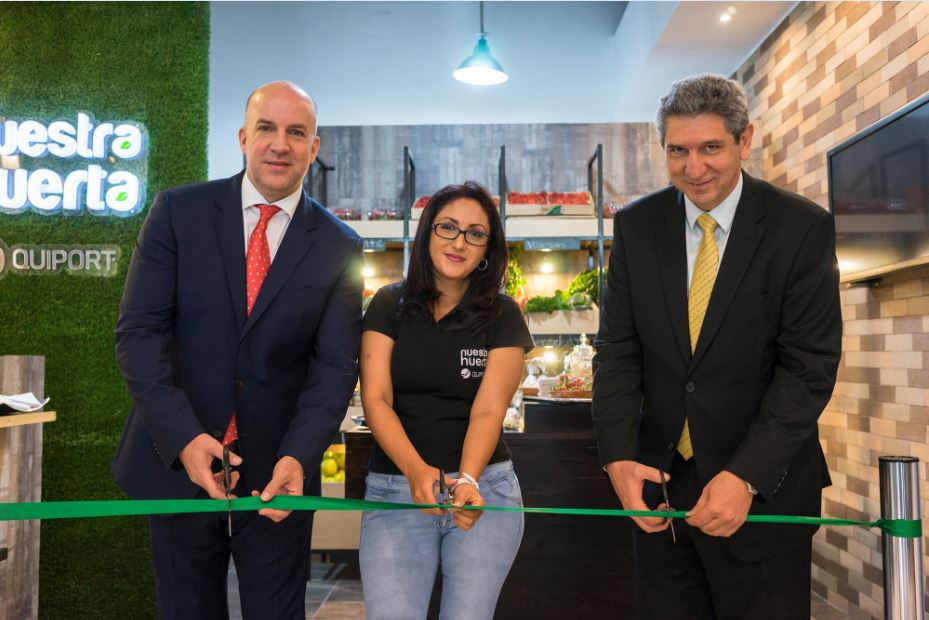
- An airport does not merely benefit its users and passengers. It also represents an opportunity for growth for its neighboring populations. This November the Mariscal Sucre International Airport has opened one of the first stores in the region offering products 100% generated by families who live in the parishes surrounding the area.
Productive activities, development of abilities, good manufacturing practices, emerging agriculture and shared values all come together into one of the most representative social responsibility projects launched by Corporación Quiport, the concessionaire of the Quito Mariscal Sucre Airport.
Located at Quito Airport Center building across the street from the airport passenger terminal, 16 farmers and their families from Puembo, Pifo, Tababela, Yaruqui and Checa are managing and directing “Nuestra Huerta” (Our Garden), one of the first regional establishments offering local agricultural products.
Andrew O’Brian, President and CEO of Corporación Quiport, explains that this is the continuation of a project that began three years ago for purposes of combining the presence of the Quito Airport with the area´s agricultural and productive potential.
“Since opening in 2013, Quipor, in charge of managing the Quito International Airport, has focused on improving the quality of life of our neighboring populations. As such we have encouraged projects involving empowerment, production development, and links with the communities. Today we proudly open this store which represents the possibility of collaboration between an airport and the communities surrounding it”, Andrew O’Brian said on its inauguration.
Conceived as an entrepreneurial project derived from Quiport’s Social Management Plan, with the technical support of the Inter-American Development Bank (IDB), “Nuestra Huerta” evolved towards a shared value scheme; that is, as a strategy that analyzes the social environment in which an organization performs, to renew its processes and generate profits while impacting communities positively. The first stage of “Nuestra Huerta” was focused on training plans for the residents of the area. Once they developed their capabilities their products were delivered to employees of airport companies, thus creating a productive chain. This whole process is why the presence of the representative of the IDB in Ecuador, Fernando Quevedo, was very important in the opening event.
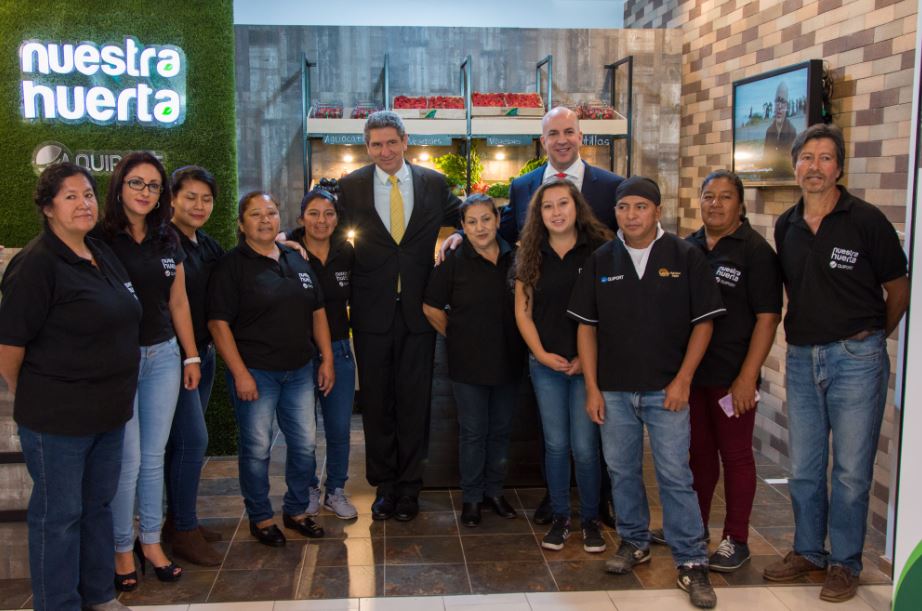
Once the project was consolidated, “Nuestra Huerta” producers founded the community enterprise named Productora Agrícola Alpachaca Muyverde Cia. Ltda., allowing them to manage the store located inside the airport. “Since the beginning of airport construction we saw the possibility of helping our families; now that “Nuestra Huerta” is already operating our wishes have become a reality and we are confident that our products will be well received by our visitors”, Rebeca Baquero, the organization’s president, explained.
“Nuestra Huerta” is now operating and offers airport employees and users the opportunity to consume healthy products prepared according to quality standards. It also allows the families living in the vicinity of the airport the possibility of having an undertaking of their own that recognizes their abilities and their daily work.
THE GENERAL ASSEMBLY OF THE AIRPORTS COUNCIL INTERNATIONAL – LATIN AMERICA & CARIBBEAN SUCCESSFULLY CONCLUDED
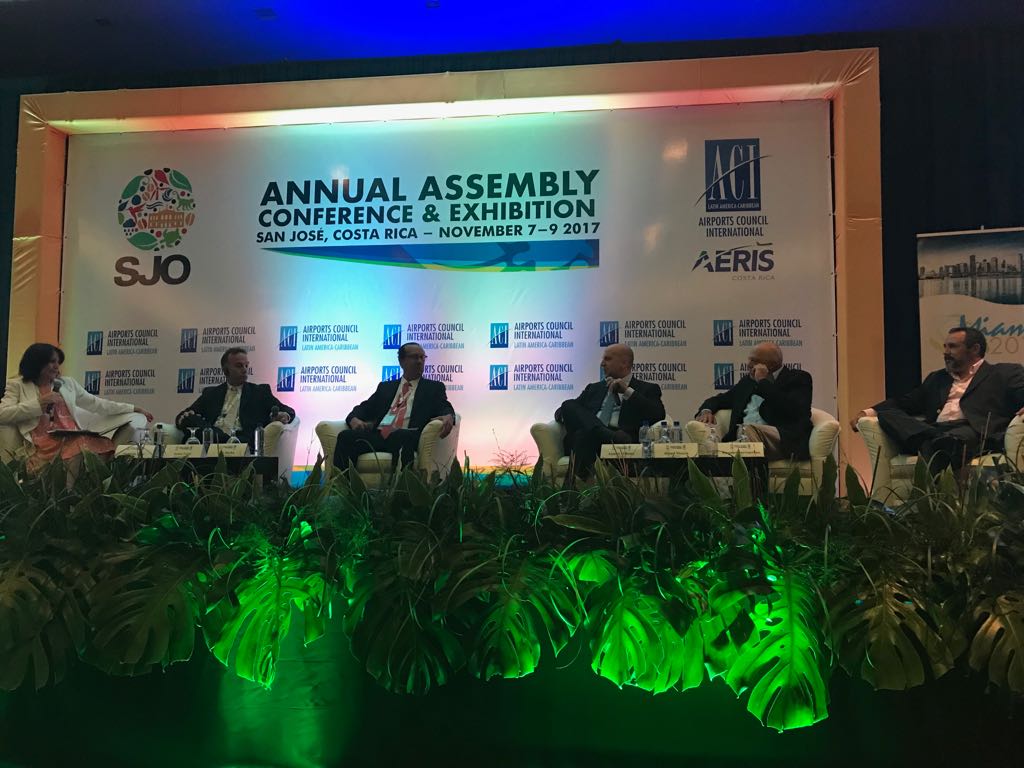
With the valuable participation of Corporación Quiport, the 27th Airports Council International – Latin America & Caribbean (ACI-LAC) General Assembly was concluded last Thursday, November 9 in San Jose, Costa Rica. Quiport’s delegation was composed of Andrew O’Brian, President and Director General; Carlos Criado, Commercial Director; Allan Padilla, Operations Director; and Jaime Pérez, Social Responsibility Manager.
Issues of vital importance to the future of the airport industry were addressed at the Assembly including airport contribution to the development of tourism, infrastructure challenges faced by airports in the region, airport security, and how technological innovation opportunities can become solutions in improving passenger experience. Matters relating to the impact on economic development, social responsibility, and environmental protection were also discussed.
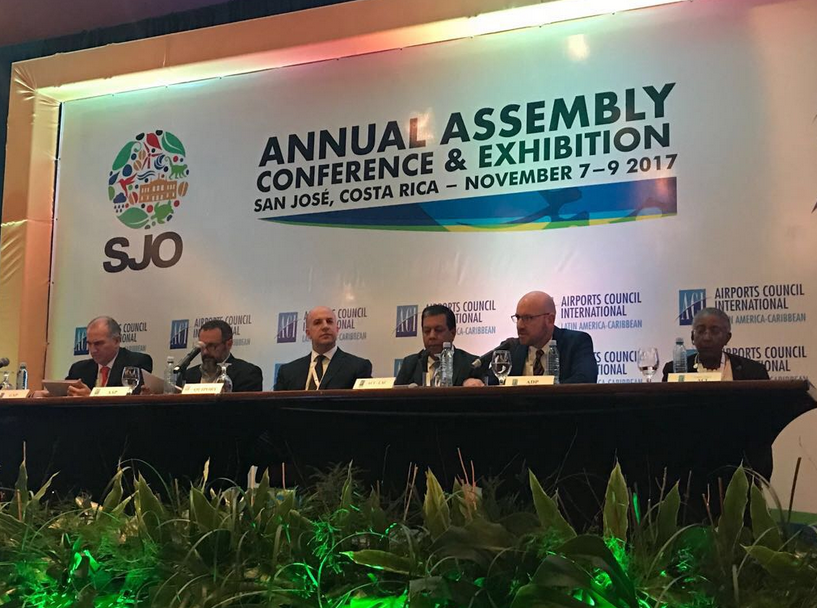
Andrew O’Brian, who also participated as panelist at the Airport CEOForum, highlighted the importance of this type of meetings. “Airport activity is one of the most dynamic in the world, and it is essential to debate and share experiences in order to better understand our role in the economic and social development of our countries and define where our efforts should be directed to adequately meet the demands of our clients, which include airlines and passengers,” said O’Brian.
In parallel with the Assembly, ACI-LAC committees meeting were held. Our team participated in the Operational Safety Committee, chaired by Allan Padilla, the Environment Committee, chaired by Jaime Pérez, and the Economic Committee, of which Carlos Criado is a member.
THE QUITO INTERNATIONAL AIRPORT INAUGURATES ITS VIRGEN DEL QUINCHE DEL AEROPUERTO DE QUITO CHAPEL
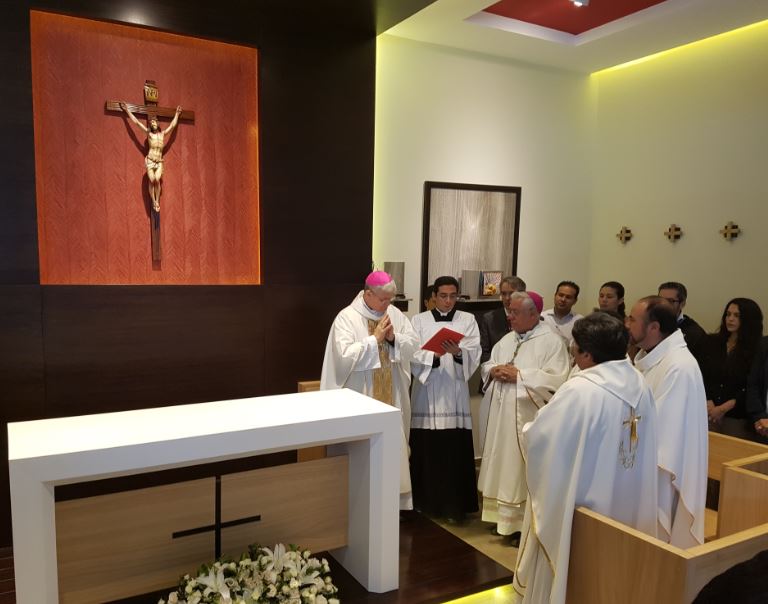
On October 19, 2017, the Quito International Airport inaugurated a chapel where individuals can freely exercise their faith. The chapel, located at the Quito Airport Center building in front of the passenger terminal, will be available to users and travelers circulating through its facilities.
The chapel was blessed by Ecuador’s Nuncio, Monsignor Andrés Carrascosa, the Archbishop of Quito and Monsignor Fausto Trávez. In the ceremony was also present Andrew O’Brian, President and Director General of Corporación Quiport, as well as various authorities from the Municipality.

The Virgen del Quinche del Aeropuerto de Quito Chapel will celebrate Holy Mass every Sunday, from October 29, at 12:30 p.m., and will be open daily, from 8:00 a.m. to 8:00 p.m. However, it holds two areas for prayer that are open 24 hours a day.
In this manner, the airport provides an adequate facility for persons who wish to pray and profess their faith.
CORPORACIÓN QUIPORT ATTENDS THE 27TH ACI ANNUAL ASSEMBLY
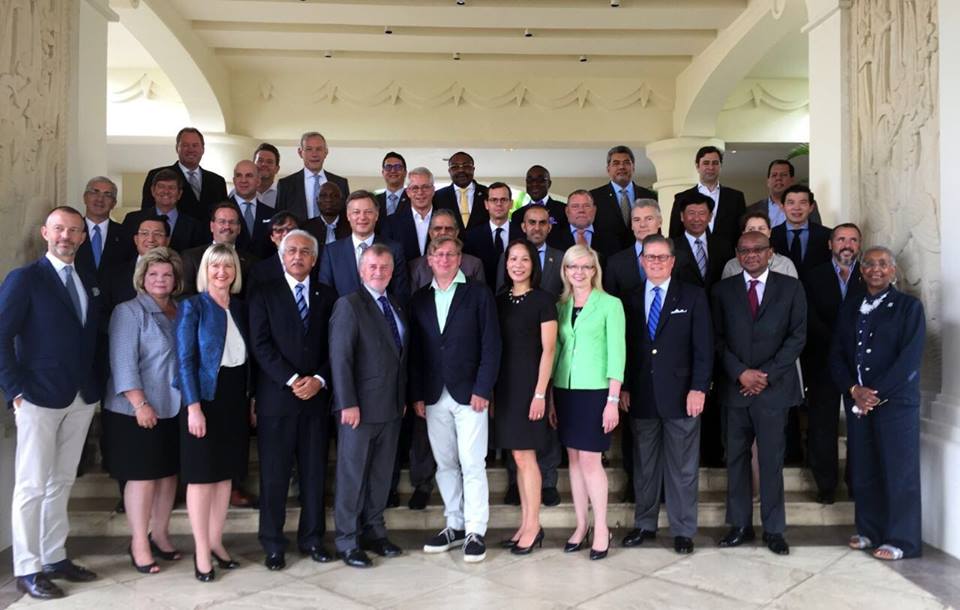
Corporación Quiport participated in the 27th Airports Council International (ACI) Annual General Assembly, represented by Mr. Andrew O’Brian, President and CEO of the concessionaire company for the Quito International Airport. Mr. O’Brian attended the forum of airport industry CEO’s from around the world as Vice President of the Board of Directors of ACI Latin America and the Caribbean (ACI-LAC).
This session of the assembly focused on interesting matters that shape the rapid evolution of the airport industry, under the theme “Bold Leadership in a Time of Change.”
Furthermore, a series of panels and committees were held during the assembly, addressing subjects of importance for the airport industry. This year, the conference addressed subjects such as safety culture, technology and innovation, connectivity and sustainable development, customer experience and airport service quality.
Allan Padilla, Director of Operations, represented the Quito Airport at the Leading Airports Seminar on Customer Service, while Jaime Pérez, EHS & SR, participated at the World Environment Committee as a member of this body representing ACI-LAC.
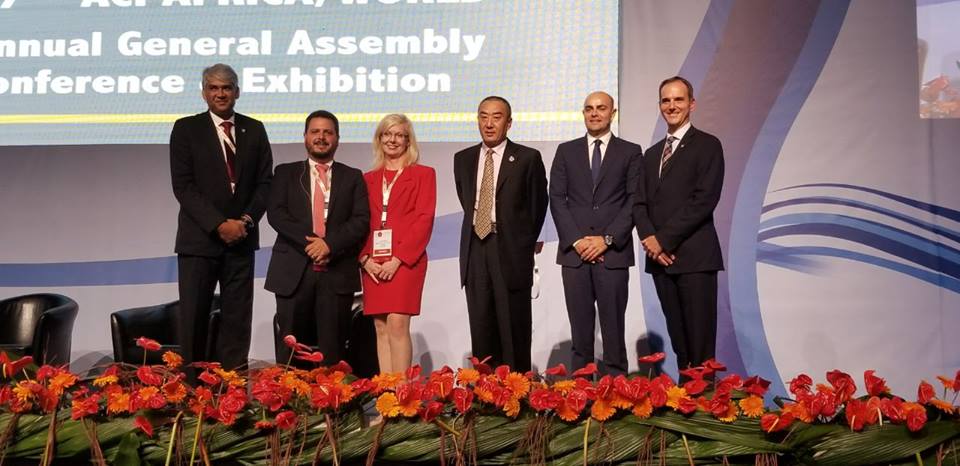

At this event, the Quito airport received two significant acknowledgements in the environmental and service quality areas.
In the environmental area, ACI formalized awarding of the Reduction Level Certification within its Airport Carbon Accreditation Program (ACA), a global initiative that seeks to reduce carbon emissions from the airport industry on a global scale.
As to service quality, the Quito airport received a trophy for obtaining third place among Latin American and Caribbean region airports due to its service quality, measured through the Airport Service Quality program (ASQ).
Quiport’s participation at these important global industry events further strengthens the Quito Airport’s position as a regional leader.
